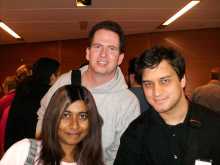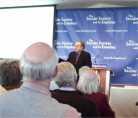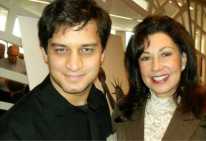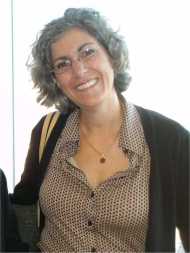The final day of The Secular Society and Its Enemies had three programs. The first, a panel titled “Secularism: The Next Generation”, was moderated by Derek Araujo and featured several young freethinkers: Matt LaClair, whom I discussed previously; Sarah Stone, a student freethought organizer from Indiana; Mark Antony Smith, a CFI intern from Arizona; Justin Trotter, the director of CFI Ontario; as well as Nica Lalli, the author of Nothing: Something to Believe In.
The panelists discussed several topics, including coming out as an atheist on a personal level, how to deal with religious relatives, and organizing efforts among young freethinkers. Surprisingly, despite polls indicating rising rates of secularism and nonbelief, three of the four panelists spoke of hostility and even, in one case, violence initiated by religious peers. Matt LaClair insightfully noted, “The nicer you are, the more they hate you.” And there was a valuable reminder to American atheists that, battered as it may be, the First Amendment is still a precious bulwark against religious encroachment: Justin Trotter discussed how, in some parts of Canada, religious schools are legally funded by tax money from the state.
After the panel, there was an address by Alan Dershowitz, who spoke about America’s founders and the way the religious right has sought to pervert the principles of separation of church and state which they laid down. The talk discussed many of the usual important pieces of evidence, including the Treaty of Tripoli, the Jefferson Bible, and the delegates’ refusal to add Christian or religious language to the Constitution. Prof. Dershowitz also pointed out that the Constitutional Convention considered a draft of the First Amendment that would simply have forbidden the government from preferentially aiding one religious sect over others (while not prohibiting the government from supporting religion in general), but rejected it in favor of the current, stronger wording. He also spoke of how the “courts are not trustworthy”, and why we must engage in grassroots organizing and not simply trust in favorable court rulings to preserve our rights as Americans.
Afterward, there was a book signing. I was chatting nearby and witnessed an ugly scene. A conference attendee who had wanted to ask Prof. Dershowitz a question during the Q&A session after the talk, but didn’t get the chance, instead confronted him at the signing. The man had printed out a CNN article which quoted Dershowitz as supporting the torture of terrorist suspects, and immediately confronted him and started yelling at the top of his voice, berating him for advocating such a thing.
Dershowitz replied heatedly (I’m sure he’s faced far more hostile questioning than this), but stood his ground. He vehemently claimed that the article had badly distorted his position, and offered to pay his interrogator a thousand dollars if he could find any other source that showed Dershowitz expressing sentiments similar to those in the CNN article. The man obviously didn’t want to believe this, but the mood of the crowd was against him, and he finally backed down.
A note to this gentleman: This is not how you handle disagreement. What would have been wrong with putting the article down on the table and saying calmly, “Professor Dershowitz, I’m very disturbed by some of the views this story attributes to you. Can you clarify what your position is on this issue?” That would have served much better than blowing your stack at the first opportunity and disrupting the entire conference only to embarrass yourself. It’s good to be passionate and willing to challenge authority, but passion does no good if it is not coupled to knowledge.
The day’s final event was a panel on Islam and secularism, featuring the scholar Paul Berman and the Islamic dissent Tawfik Hamid. Dr. Hamid, who’s been on Point of Inquiry previously, had a fascinating story. Born in Egypt, the son of secular parents, in his youth he was seduced by Islamic radicalism and joined the terrorist group Jamaat al-Islamiya. During that time, he was a personal associate of Ayman al-Zawahiri – now one of the leaders of al-Qaeda. Fortunately, Dr. Hamid heard the call of reason and renounced the group’s violent ideology before actually committing any acts of bloodshed. Today he’s a secular Muslim working to oppose the spread of Islamism and terrorism and promote a new, more peaceful interpretation of the Qur’an.
During the talk, Paul Berman drew some insightful connections between extremist Islam and European totalitarian movements such as fascism, Nazism and communism. The connections were often literal – many of the forerunners of today’s jihadists studied and were educated in Europe, and consciously adopted the vocabulary and concepts of the European totalitarian leaders. Likewise, each of these movements has a mythology that portrays true believers as an intrinsically superior people, unjustly oppressed by the rest of the world, who will rise up and overthrow the oppressors in a glorious, apocalyptic struggle.
Dr. Hamid (who came to the talk with security present), offered a counterpoint to this argument. He spoke of the violent teachings in the Qur’an and the hadith, and of the historical misfortune that the strictest, most intolerant brand of Salafist Islam took root in Saudi Arabia. When oil was discovered there, many Muslims decided that petro-wealth was Allah’s blessing for the Saudis’ obedience and resolved to do likewise. He also said that education can counteract the teachings of radical mullahs, but that, like other totalitarian movements, Islamism’s ideologues are beyond rational debate and need to be confronted and defeated militarily before a new generation can be made receptive to a more tolerant and liberal strain of thought.
After the talks, I got a few more pictures:
 We bloggers have to stick together. 🙂 With Shalini from Scientia Natura and Tommy from An Exercise in Futility (whose own posts about this conference are well worth reading). |
All in all, the conference was an amazing experience. The Center for Inquiry did a bang-up job in getting some of the secular movement’s most renowned representatives together under the same roof, and all the events were well-planned, entertaining and highly informative. (By way of gratitude, it’s worth mentioning their ongoing capital campaign to build a new headquarters in New York City – I encourage you to consider donating.) If this event is held again next year, I’ll gladly attend. If secularists and freethinkers can organize to the degree that religious groups are organized, I believe we’d be a political and cultural force to be reckoned with, and events like this one are valuable steps both in building that community, in reinforcing our ideals and principles, and in getting the word out to people who might be persuaded to join us.



